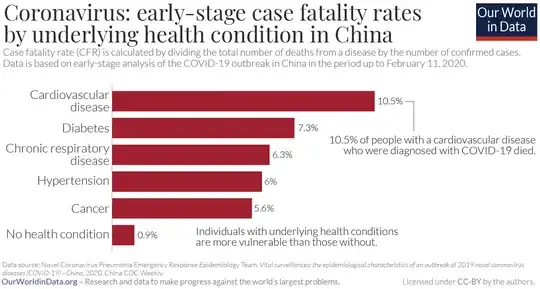Coronavirus death rates are higher for people in the range of 80+ (14,8%) and 70-79 years old (3,6%). However, there are countries, specially in Africa, where life expectancies are in the 50-60 and 60-70 years old range. Some people (like Bill Gates) warned about possible catastrophes if the virus massively reachs Africa. Could it happen than the lower life expectancy of those countries prevents more people from dying? Is people who lives 60 years old in countries with lower life expectancy, expected to have the mortality rates for Coronavirus of the people of the same age in countries with higher life expectancy, or a person of 60 years old in countries like those is in a physical state of an older person in a more developed country and as such have a higher mortality rate?
3 Answers
Age is a red herring, only a secondary characteristic correlating to death rates.
It's people that are already seriously ill or already have weak immune systems that are most likely to die soon after contracting Covid-19. And it's when people are clustered in a close community that they are most likely to contract the disease.
In our society, the people in those circumstances tend to be old and in health-care facilities. As a result, most of our deaths so far have involved people over 80 years old.
In other societies, a lack of old people doesn't necessarily mean a lack people living in close quarters, that are weak or sick.
There's certainly no shortage of such conditions in many parts of Africa.
- 633
- 1
- 4
- 18
Death risk from COVID-19 increases greatly with underlying diseases:
Patients who reported no pre-existing ("comorbid") medical conditions had a case fatality rate of 0.9% (Worldometer, Feb 29, 2020).
The most common underlying diseases in those who died from COVID-19 were: cardiovascular disease, diabetes, chronic respiratory disease, hypertension and cancer. So, it's not really age, but an underlying disease that increases the risk of death in COVID-19.
The median age of those who died so far from COVID-19 in Italy with life expectancy 83.4 years was 81 years:
Borrelli said the median age of the people who have died from the virus in Italy is 81 years of age (CNN, March 6, 2020).
and in China with life expectancy 74.6 years, it was 75 years:
On 23 February 2020, the number of people diagnosed with COVID‐19 in China was 1879 times of that on 10 January 2020. They estimated the case fatality rate of COVID‐19 to be 2.84% based on their patient pool. The authors also found that the ratio of male to female deaths was 3.25:1, the median age of death was 75 years (Journal of Medical Virology, Feb 25, 2020).
In the US with life expectancy 78.9 years, it was 80 years.
The risk of death from COVID-19 increases with chronic diseases and therefore with age. Moth deaths so far have been on Northern hemisphere in countries with life expectancy above 74 years. Moth countries with life expectancy lower than 65 years are on Southern hemisphere or around equator, where it is warm now, which is a likely reason for much fewer cases of infection there.
In countries with low life expectancy, mainly in Africa, there are other potential risk factors for COVID-19: widespread parasitic diseases (malaria, intestinal parasites, etc.), malnutrition and less available health care, which are not associated with age.
In conclusion, even if in the countries with low life expectancy, lower average age (and hence less chronic diseases) can be a protective factor against COVID-19 deaths (Worldometer), we do not yet know the effects of other risk factors in these countries.
- 15,851
- 24
- 70
-
I think that article says the median age of infected people in China is 51 years old, not the median age of people who died, though not sure – Pablo Mar 12 '20 at 15:48
-
@Pablo, that's correct; I found a reliable source that says that median age of death from COVID-19 in China is 75 years. – Jan Mar 12 '20 at 16:26
-
It's no surprise that a country with a higher life expectancy has a higher median age of death (there are simply more old people), so that observation does not support your final point about death rates. On the contrary, Italy's death rate is notably higher than China's, which exactly in line with the hypothesis that a higher life expectancy is associated with a higher death rate. – Nuclear Hoagie Mar 12 '20 at 16:47
-
@NuclearWang, I'm editing my conclusion. Anyway, I was not talking about "median age of death" but about median age of death due to COVID-19." – Jan Mar 12 '20 at 16:50
-
1@Jan, Given that the fatality rate of 20-29 year-old is 0.2%, and that the proportion of those in this range with comorbidities are probably higher than 0.2%, is it safe to assume that a healthy 20-29 year-old has statistically negligible risk of death just as common cold and flu? – Math.StackExchange Mar 14 '20 at 10:06
-
1@Math.StackExchange, if you ask this as a new question, I'll answer. – Jan Mar 14 '20 at 13:06
The Accepted Answer by Ray Butterworth, while reasonable when it was written (March 2020), now appears to be wrong. Hardest hit countries have mainly been those with longest life expectancies (Europe, N. America) while Africa has had very low death rates from Covid (Europe 964 per million, Africa 70 per million, Our World In Data, 2021 Feb 5). Multiple studies have found a high correlation between life expectancy and covid deaths, e.g. Frontiers | Covid-19 Mortality: A Matter of Vulnerability Among Nations Facing Limited Margins of Adaptation,
- 1
- 1
